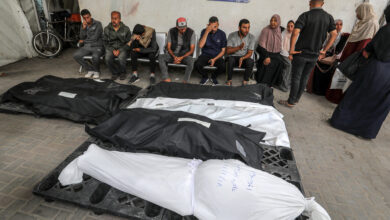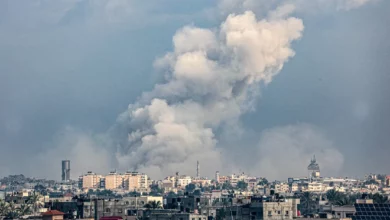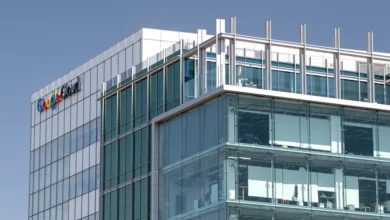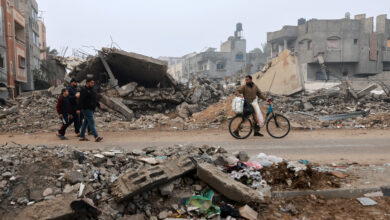Over the weekend Foreign Minister Ahmed Abul Gheit announced that Egypt will prohibit aid from entering the blockaded Gaza Strip through the Egyptian border. The decision came after the Viva Palestina aid convoy, led by British MP George Galloway, entered Gaza through Rafah prompting clashes between international activists and Palestinians on one side, and the Egyptian military on the other. Abul Gheit’s announcement means that aid can no longer enter Gaza through the only border crossing not controlled by Israel. The implications for Gazans, more than half of whom are registered refugees, will be dire.
This decision, the building of the wall, and even the level of support provided by Arabs to the United Nations Relief and Works Agency for Palestine Refugees in the Near East (UNRWA)–the organization that maintains refugee camps, provides food aid, and manages the majority of hospitals and schools for Palestinian refugees–test the position of Arab states towards the Palestinian cause.
Last year, Arab countries contributed only one percent of funds for UNRWA’s regular operating budget. Even if the Arab states reached the target set by the Arab League, it would only account for 7.8 percent of UNRWA’s total operating budget.
"I think it’s something that hasn’t particularly interested them," said Karen AbuZayd, the outgoing director general of URNWA, regarding contributions from Arab states to her organization in an interview with Al-Masry Al-Youm last month in Cairo. According to AbuZayd, contributions to the general operating fund of an organization like UNRWA is not "the way charity is understood" in the Arab world.
Hisham Youssef, a spokesperson for Arab League Secretary-General Amr Moussa’s office, offers a different explanation.
Youssef says that the Arab states provide the majority of their support for the Palestinians through the Palestinian Authority, the administrative organization set up to govern Gaza and the West Bank. "Assistance provided by Arab countries for budget support or humanitarian assistance is huge," Youssef says. "It’s not as much as the needs of the Palestinian people, but in the last seven or eight years, the average of total contributions was around half a billion dollars per year."
Even so, UNRWA is a crucial lifeline for 4.6 million Palestinian refugees. The organization was founded in 1949 to assist Palestinians displaced during the 1948 Arab-Israeli war. UNRWA’s mandate was temporary, but has been renewed every three years since. As of 2007, the organization was operating 663 schools and 125 primary health care facilities and had provided more than US$100 million in microcredit loans to Palestinian refugees.
UNRWA also provides food aid, which is particularly important in the Gaza Strip, which has been under blockade since the militant Islamist group Hamas took control there in June 2007. According to statements by UNRWA Director of Operations in Gaza John Ging at the Arab League Headquarters in December, "food insecurity is now at 61 percent in the Gaza Strip and 25 percent in the West Bank.[..] Higher insecurity occurs in the refugee camps. Gaza households are particularly insecure with 80 percent dependent on food aid assistance." In the coming year, UNRWA hopes to provide US$93 million in food aid to Palestinian refugees.
Funded by voluntary contributions from governments around the world, the United States provides most of UNRWA’s budget–about 70 percent–followed by the European Commission, which covers about 20 percent. The rest is made up by donors from elsewhere. "In 2009 Arab countries have contributed only one percent to our regular budget," AbuZayd said in a press conference at the Arab League headquarters in Cairo.
Meanwhile, the organization is floundering financially. Last year UNRWA came close to bankruptcy. "We were still looking for money to pay our salaries last month," AbuZayd said in an interview with Al-Masry Al-Youm in December. "What we have done now over the last year is use up our working capital, which is not a good thing for an organization to do."
To make matters worse, UNRWA expects operating costs to increase by 3.5 percent next year. Each year there are more Palestinian refugees than the year before. Furthermore, the Israeli blockade on Gaza has increased the need for humanitarian aid to the more than one million Palestinians who live in the Strip.
AbuZayd doesn’t want to place blame on any particular parties for UNRWA’s funding shortfalls, particularly not the Arab states.
"People think the Arabs have huge amounts of money, which I suppose some individual states and individuals have, but when you look at what is the GDP of one of the Arab states compared to the GDP of even Luxembourg or Italy or somewhere, then [the Arab states’ target donations of 7.8 percent of UNRWA’s budget] seems a reasonable amount," she said.
But according to the World Bank, Luxembourg has a GDP of US$54.3 billion, while Egypt’s GDP stands at US$163 billion. The World Bank also reports Italy’s GDP as US$2.29 trillion, with Saudi Arabia’s GDP at US$468 billion.
Youssef agrees that it is not the responsibility of the Arabs to take on the financial burden of the United Nation’s organization for Palestinian refugees. "UNRWA has a specific mandate and it is being paid by the international community," Youssef said. "It is an obligation for the international community. They have to address the issue of refugees […] as a result of successive wars in this part of the world."
The problems of Palestinian refugees certainly go much deeper than the financial troubles of the UN agency responsible for providing for them in five locations. In many countries, Palestinian refugees are denied basic human rights. Jaber Suleiman, a researcher and member of A’idoun Lebanon, a Beirut-based organization advocating for the right of return for Palestinian refugees, believes that there are much more systematic problems than just those of UNRWA. "In Egypt, Palestinians are living in very bad conditions," Suleiman said. Even in Jordan, which has granted citizenship to many Palestinian refugees, they are living in bad conditions, he said.
Suleiman, like Youssef, believes that Arab governments have a responsibility to Palestinian refugees that includes supporting humanitarian aid. "This could be included in socio-economic rights," Suleiman says. "But it is a sensitive political issue for the Arab governments. They consider it the responsibility of the international community. The international community is responsible. Israel is responsible."




